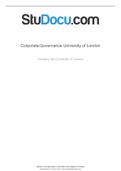lOMoARcPSD|17625498
Corporate-Governance University of London
Company law (University of London)
StuDocu is not sponsored or endorsed by any college or university
Downloaded by Zainub Gillani (zaniub.gillani@gmail.com)
, lOMoARcPSD|17625498
Barrister Ali Ishtiaq
Company Law
Corporate governance
(Corporate management)
Corporate decision making are carried out by those officers who stand at the company's helm,
namely the members of its board of directors. The Companies Act does not provide an
exhaustive definition of the term director beyond stating in Sec 250 CA 2006, that the term
includes, '' Any person occupying the position of director, by whatever name called.''
The CA does not attribute specific functions to company directors, or lay down the structure
and form of corporate management generally. This is left to the Articles of Association.
(Development)
The 19th century view of the role of company directors was that, they were merely agents of
the company's shareholders. As discussed before, there are two primary collective corporate
organs, the board of directors and the shareholders in general meeting. Historically the
shareholders in a general meeting had constitutional supremacy in so far as the directors, as
its agents, had to act strictly in accordance with its decisions. (Isle of Wight v Tahourdin).
This view of the company or shareholders in general meeting was steadily eroded by the
courts of the 20th century. Not by specific law reform, but by changing practice and social
phenomena. In public limited companies, also known as listed companies, share ownership is
now more widespread and the attention of shareholders both private and institutional, is by in
large focused upon investment returns rather than upon monitoring directorial conducts.
The general meeting in large public companies particularly through the use of proxy voting
(Shareholders do not personally attend the voting, but rather send a written notice or, more
usually, assigned their votes to the board of directors to exercise as it's wishes). Hence it
often becomes a little more than a forum for rubber stamping board room decisions. This shift
of power as identified by Berle and Means in their pioneering empirical study conducted
between 1929-30, demonstrated the consequences of the separation of ownership from
control, taken together with the dispersion of share ownership, was that shareholders would
no longer be able to control the direction of the company (This study had an immense
influence over the form and approach of modern corporate governance regulation). If the
shareholders disagree with the director’s management of the company, the only realistic
option often open to them is to sell their shares and leave.
(The rise of directorial autonomy)
In Automatic self-cleansing filter syndicate v Cuninghame, the issue was whether or not, the
directors were bound to give effect to a resolution of the company in general meeting. Collins
MR, having reviewed the AoA, observed that, unless a special resolution was invoked, it was
impossible for a mere majority at a meeting to override the views of the director. The board
of directors, therefore occupies a preeminent position in the management of companies
(Towcester Racecourse v Racecourse Association). The position is that, directors who are
subject either through removal by a general meeting, Sec 168 CA 2006, or by the AoA
cannot be controlled by the shareholders in general meetings as if they were delegates or
Downloaded by Zainub Gillani (zaniub.gillani@gmail.com)




